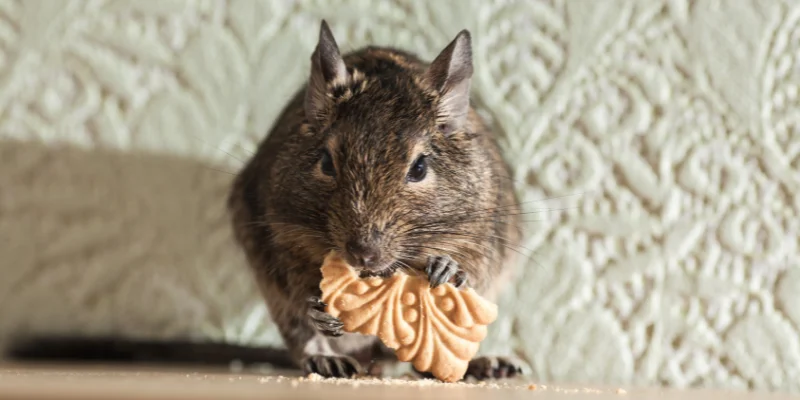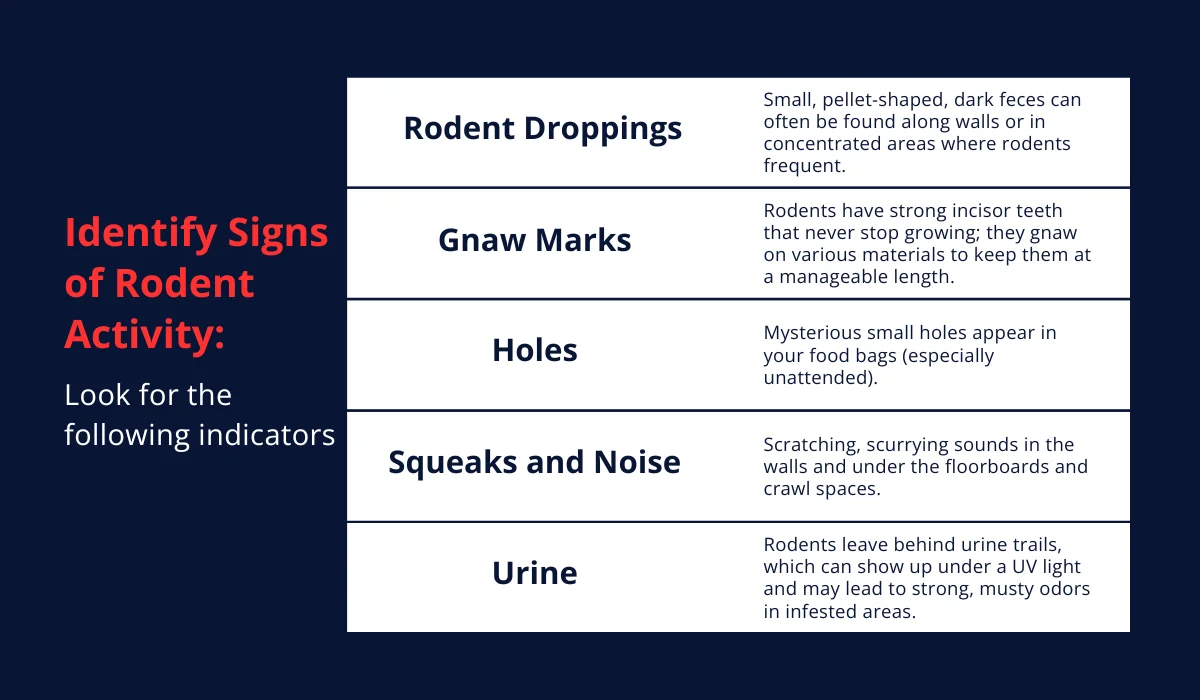
New Orleans’ warm climate and abundant waterways create a perfect storm for rodent infestations.
These unwelcome guests can not only inflict serious damage on your property but also threaten your health by potentially spreading diseases.
The key to rodent control lies in prevention—keeping your home clean and devoid of food temptations is your first line of defense.
Key Takeaways
- Rodent control in New Orleans requires knowledge of local species and their behaviors.
- Prevention through sanitation and property maintenance is crucial for controlling rodent populations.
- Once an infestation occurs, strategic removal and repair are necessary to manage the issue.
Preventing Rodents in New Orleans, LA
Maintaining cleanliness is key for deterring rodents. Effective rodent control in New Orleans hinges on proactive prevention measures and rigorous sanitation practices.
Focusing on these areas significantly reduces the likelihood of rodent infestations by removing attractants.
Securing Food Sources and Water
You must make sure that food and water sources are inaccessible to rodents.
- Pet Food: Store in rodent-proof containers and sweep up any spillage.
- Food Crumbs: Clean up immediately; do not leave out overnight.
- Tap Leaks: Fix promptly to prevent the pooling of water.
- Grease: Wipe surfaces to clear oil and grease.
Securing Trash
Outdoor trash receptacles should have lids that seal tightly and be made of materials that are not easily gnawed through.
- Trash Bins: Must be emptied regularly and kept clean.
- Compost: Is contained properly, away from the house.
Strategies for Getting Rid of Rats
In New Orleans, homeowners like you may often encounter challenges with rodents.
The two main methods to address these challenges are do-it-yourself solutions and rodent control services.
Each approach requires specific steps and considerations for effective rodent control and removal.
DIY Removal Approaches
Addressing rodent problems can often be managed effectively through DIY strategies, executed carefully and according to product guidelines.
While DIY methods can be effective for minor infestations, they may require persistence and follow-through to achieve lasting results. DIY strategies include:
Traps
Utilizing a mouse trap is a common DIY rodent removal and control method.
The variety of rodent traps available allows for flexibility based on personal preference and the specific rodent issue.
| Trap Type | Description |
| Traditional Snap Traps | Economical and effective for quickly eliminating mice and rats, such as glue traps |
| Electronic Traps | Deliver a lethal dose of electricity to kill rodents instantly and humanely. Ideal for those seeking a mess-free solution. |
| Live Traps | Allow for the capture and release of rodents without harm, suitable for those looking for a humane option. |
Rodenticides
Rodenticides are in the form of pellets in the rodent bait stations. They offer a chemical approach to rat control.
| Rodenticide Type | Description |
| Bromadiolone | Highly effective but should be used with caution due to its potential secondary poisoning risks to non-target wildlife and pets. |
| Brodifacoum | Known for its potency and long-lasting effect and poses significant risks of secondary poisoning. |
| Diphacinone | Considered safer for use around non-target animals due to its lower toxicity and the need for multiple feedings. |
Repellent Sprays
A rodent-repellent spray offers an effective and non-invasive method for those seeking a gentler approach.
These sprays contain natural ingredients like peppermint oil, which is safe for children, pets, and rodents and is a potent deterrent against them.
Ultrasonic Rodent Repellents
These devices emit high-frequency sounds intolerable to rodents but not heard by humans or most pets, driving them away from your home.
| Device Type | Description |
| Classic Ultrasonic Repellent | Ideal for small spaces like kitchens or garages. |
| Advanced Ultrasonic Pest Repeller | Designed to affect rodents’ nervous systems, making it more effective over larger areas and multiple rooms. |
| Portable Ultrasonic Repeller | Ideal for travelers or those looking to protect areas like RVs, tents, or small storage spaces. |
–
Get $15 Off Your Rodent Service Today!
–
Professional Rodent Extermination Services
Knowing the exact steps of the treatment plan for rodent removal services can provide immense peace of mind when dealing with a rodent infestation.
At LaJaunie’s Pest Control, we follow a thorough and transparent process to ensure your home is rodent-free as one of the pest control services in New Orleans.
Here’s an overview of the step-by-step integrated pest management process:
- Determine the Type of Service Needed: Regular pest control or a detailed inspection for complex situations.
- Schedule Inspection: Agree on a date and time for the state-certified inspector to examine your property.
- Inspection Day: The Inspector arrives, notifies you, and performs a detailed exterior inspection to pinpoint problem areas.
- Proposal and Agreement: Discuss findings and proposed solutions and schedule the wildlife job upon agreement.
- Wildlife Job Execution: The crew arrives with all necessary equipment, rechecks account notes and photos and notifies you of their arrival.
- Completion of Exclusion Work: Perform exterior and attic exclusion work as needed, using materials like cement or steel for gaps ¼ inch or larger and securing potential entry points.
Repairing Damage and Preventing Future Rodent Infestations
Effectively managing rodent control in the New Orleans area involves two crucial steps:
- Repairing the damage caused by these critters
- Taking decisive measures to prevent them from returning
Repairing the Damage Caused by Rodents
Rodents, whether you’re dealing with mice or rats, can cause significant damage to your property.
Electrical and Structural Repairs
First and foremost, inspect your property for chewed wires or structural damage. Rodents have a penchant for gnawing on electrical wires, which can lead to short circuits or fires.
It is crucial to hire a professional electrician to repair any damaged wires. Additionally, assess the integrity of walls, beams, and insulation.
Replace or repair any compromised materials to restore your home’s safety and comfort.
Insulation Replacement
Rodents often nest in insulation, rendering it ineffective and unsanitary. If you find any insulation damaged by rodents, removing and replacing it is best.
New insulation will keep your home warm and reduce the risk of diseases rodents may carry.
Preventing Future Rodent Infestations
After addressing the immediate damages, the next step is ensuring these critters can’t return to your home.
Sealing Entry Points
Conduct a thorough inspection of your home’s exterior through rodent exclusion. Key areas to focus on include:
- Attics and Garages: Check for gaps or holes and seal them with rodent-proof materials, such as steel wool embedded in quick-setting cement.
- Doors and Windows: Install weather stripping and repair any broken screens.
- Vents and Chimneys: Cover openings with wire mesh to prevent rodents from climbing in.
Aside from caulk, seal these openings with durable materials in this sealant checklist:
- Quick-setting cement
- Steel wool
- Wire mesh
- Weatherstripping
Regular Maintenance and Inspection
Consistent upkeep and routine checks are the backbone of preventing future rodent infestations. Property owners like you should:
- Inspect Wiring Regularly: After repairs, look for chewed wires, especially in hidden areas like basements or behind baseboards.
- Maintain Cleanliness: Reduce appeal by keeping areas free of food debris and clutter.
- Schedule Professional Inspections: Have a specialist conduct thorough inspections bi-annually to spot early signs of rodent activity. If the problem is urgent, you’ll find that a pest control professional can usually make it out for a same-day inspection.
Common Rodent Species In New Orleans
Rodent control in the New Orleans area requires familiarity with local species, as this region is home to rodents like roof rats.
According to the CDC, these rodents can carry hantavirus and spread disease to humans.
Recognizing Local Rodent Species
In New Orleans and the surrounding areas, there are a few prevalent species you should be aware of:
| Rodent | Scientific Name | Description |
| Norway Rat | Rattusnorvegicus | Also known as the brown or common rat; large rodents with reddish-brown fur are adept swimmers. |
| House Mouse | Mus musculus | A small rodent with a grey coat; common in domestic settings with rapid breeding. |
| Deer Mouse | Peromyscus maniculatus | A bi-colored appearance with white feet and underbellies; prefer rural and semi-rural areas. |
| Squirrel | Sciurus spp. | Includes the Eastern gray squirrel and the red squirrel, known for their bushy tails and acrobatic movements in trees. |
How to Identify Signs of Rodent Activity?

To determine the presence of rodents, look for the following indicators:
- Rodent Droppings: Small, pellet-shaped, dark feces can often be found along walls or in concentrated areas where rodents frequent.
- Gnaw Marks: Rodents have strong incisor teeth that never stop growing; they gnaw on various materials to keep them at a manageable length.
- Holes: Mysterious small holes appear in your food bags (especially unattended).
- Squeaks and Noise: Scratching, scurrying sounds in the walls and under the floorboards and crawl spaces.
- Urine: Rodents leave behind urine trails, which can show up under a UV light and may lead to strong, musty odors in infested areas.
Rodent Problem? A Professional Exterminator Can Help
Remember, when rodent infestations are severe or persistent, calling a professional pest control expert in New Orleans is the best way to tackle your rodent problem quickly.
If you have a persistent rodent problem and need help, book a service now or give us a call at (+1)985-859-7378 to secure fast and effective pest control services.